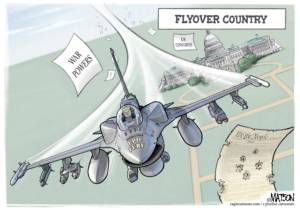Iran: This is for real
Published 3:03 pm Thursday, June 18, 2009
WASHINGTON — What’s happening on the streets of Tehran is a lesson in what makes history: It isn’t guns or secret police, in the end, but the willingness of hundreds of thousands of people to risk their lives to protest injustice. That is what overthrew the shah of Iran in 1979, and it is now shaking the mullahs.
This is politics in the raw — unarmed people defying soldiers with guns — and it is the stuff of which revolutions are made. Whether it will succeed in Iran is impossible to predict, but already this movement has put an overconfident regime on the ropes.
To understand why the regime is frightened, ask yourself this question: How many of the demonstrators in the mile-long parades along Vali-e Asr Avenue were Iranian nuclear scientists — or their brothers, or cousins? We read that the oldest daughter of opposition presidential candidate Mir Hossein Mousavi is a nuclear physicist, but how many more?
And how many disgruntled Revolutionary Guards, and war veterans?
Nobody knows, and that’s the point: The regime must be frightened of the forces it has unleashed. The more it attacks its own people, the more vulnerable it becomes.
If you take a step back, you can see a similar process of ferment across the Muslim world these days. Muslim parties and their allies have suffered election setbacks over the past several years in Algeria, Iraq, Jordan, Kuwait, Lebanon, Morocco and Pakistan. The most extreme group of all, al-Qaida, has alienated former supporters everywhere it has tried to put down roots.
The reasons for these political setbacks vary from place to place. In some countries, Muslim radicals have overreached and created a public backlash; in others, they have been seen as timid and corrupt. But there’s a common theme: “The Muslim parties have failed to convince the public that they have any more answers than anyone else,” says Marina Ottaway, the director of the Middle East program at the Carnegie Endowment for International Peace.
President Obama was right to speak carefully about the events in Iran during the first week of protest. But it’s time for him to express his solidarity with the Iranians who are so bravely taking to the streets each day. He can do that without seeming to meddle if he chooses his words wisely.
Obama should invoke the Iranian yearning for justice — which was a powerful theme of the revolution. He should cite Iran’s own rich history of political reform, going back to Cyrus the Great, whose declaration of human rights was chiseled in the Cyrus Cylinder in 539 B.C. He should cite the Iranian constitution of 1906, which established elections and basic freedoms. Democracy is not an American imposition but an Iranian tradition.
“We clearly have to be on the right side of history here,” says Karim Sadjadpour of the Carnegie Endowment and an informal adviser to the White House. But he cautions that “if we try to insert ourselves into the momentous internal Iranian drama that’s unfolding, we may unwittingly undermine those whom we’re trying to strengthen.”
Obama’s agenda of “engagement” with Iran must be on hold for now. He shouldn’t renounce his offer of talks, but allow it to sit. Let the Iranians chase the West for a while; they’re the ones who need legitimacy.
The biggest gift the West can give the Iranian people is to keep open the lines of communication. The regime wants to turn off not just the foreign press coverage but Internet traffic. America and its allies can counter that blackout. We can push broadband access into Iran via satellites, or via existing Internet relays along the Iraq-Iran border, from Basra to Sulaymaniyah. If the world keeps watching, the protesters will be emboldened, and the mullahs will be checked.
Today the regime’s nightmare is coming true. For the past few years, Iran’s leaders have worried about a “color revolution,” on the model of Georgia or Ukraine. Guess what? It’s happening. The mullahs face a dilemma: If they make concessions, they look weak. If they try to crack down, they may inflame the movement even more. It’s precisely the choice that the shah and his secret police faced in 1978 and ‘79.
The simple fact is that Iran’s repressive rulers have overplayed their hand. By manipulating the election results, they have created a popular backlash. Iranians now are voting with their feet, and with their blood. The regime blames Western meddling; they should be so lucky. This is real.
David Ignatius is a Washington Post columnist. His e-mail address is davidignatius@washpost.com.


